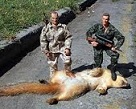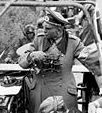wosung
Posts: 692
Joined: 7/18/2005
Status: offline

|
quote:
ORIGINAL: el hefe
No, those pools are specifically for the Eastern Front and Jim would have to give you the specifics on the production model. My point is that it is difficult to first of all figure out exactly how many units of x went to Russia. Anybody have the exact number of 105mm Howitzers or the number of Bf-109G6s that were sent to Russia as replacements during the entire war? We know about how many total were produced during the war and then we have to strip out the number of units were shipped with reinforcing units and thus leaving us with a rough number of units that were shipped as replacements. Then we say that x % were shipped East and then we average that number over the number of months of the conflict. This doesn't model any production that increases or decreases over time as it is just an average so it would be a lofty goal to make a production model that is dynamic enough to model the complexities of historical production. Not being defensive here but production is a tough one and compromises were made to make a game. There is so much information that is hard to obtain that you end up making educated guesses. Try figuring out the German manpower situation in 1941. Thats a fun on too.
Trey
Using average numbers for production probably made the game easier to design and to code. So it was the right decision to take.
OTH, fixed average production numbers don’t represent German weapon allocation for the Eastern front, which was not very steady during the war. Tanks were held back to equip new units instead of strenghtening those up front. The decision maker’s strategic outlook about a quick victory in the East in 1941 influenced weapon allocation in the Führer state considerably, as well as changing the strategic Schwerpunkt towards Western Europe in late 1943. So, for the East replacements there were considerable ups and downs from month to month. No fixed replacement percentage for the 1941-1945 time span possibly could represent this. Arguably, the percentage of East replacements out of the total German production pool, could have reached its peak in 1942 and 1943, after the sure bet Barbarossa was fought with older use-w/o-replacement-weapons (Verbrauchsgerät) and before the strategic reorientation.
But collecting valid data about East-only weapons allocation IS a royal pain. FREX, apparently valid allcation numbers for field and AT guns in 1941 just don’t exist. Until Oct. 1941 those (well known) losses more or less were made up from general-quartermaster’s pool plus by transfers from Commander Ersatzheer and from Quartermaster West. From then to the end of the year losses simply weren’t made up, because it was planned to repatriate most Ostdivisions after the expected victory without their heavy equipment and their heavy weapons. This material was to make up losses in the occupational forces remaining in the East. Bottom line: No exact numbers for 105 mm howitzer replacements for 1941.
Sources:
Bernhard R. Kroener, Die personellen Ressourcen des Dritten Reiches im Spannungsfeld zwischen Wehrmacht, Bürokratie und Kriegswirtschaft 1939-42 [Third Reich’s personnel ressources between Wehrmacht, bureaucracy and war economy], in: Deutschland und der Zweite Weltkrieg, vol. 5.1, pp. 693-1001, esp. p. 867.
Ibd., p. 868. Rolf-Dieter Müller, Das Scheitern der wirtschaftlichen "Blitzkriegstrategie" [The failed economic Blitzkrieg strategy], in: Das Deutsche Reich und der Zweite Weltkrieg, Vol. 4, Der Angriff auf die Sowjetunion, pp. 936-1078, see pp. 974-975. http://www.matrixgames.com/forums/tm.asp?m=2684171&mpage=1&key=�
As for German manpower situation in 1941:
http://www.matrixgames.com/forums/tm.asp?m=2696271&mpage=1&key=�
Regards
|
 Printable Version
Printable Version



















 I'll take 200 in the pool over 0 and be **** grateful.
I'll take 200 in the pool over 0 and be **** grateful.
 New Messages
New Messages No New Messages
No New Messages Hot Topic w/ New Messages
Hot Topic w/ New Messages Hot Topic w/o New Messages
Hot Topic w/o New Messages Locked w/ New Messages
Locked w/ New Messages Locked w/o New Messages
Locked w/o New Messages Post New Thread
Post New Thread